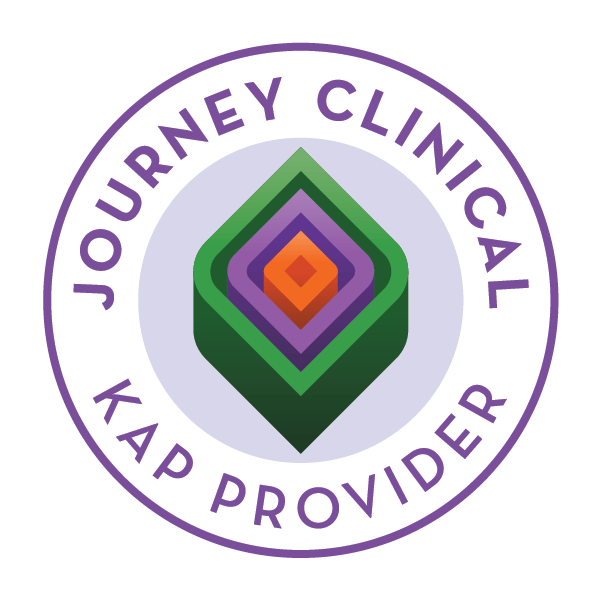
You are carrying heavy burdens; the weight feels visible.
You’ve tried many different therapy modalities and medications, yet nothing feels like it’s working. At times it feels like you’ve made progress and then find yourself right back in that stuck feeling. It’s tiring. It’s more than tiring. You’re exhausted of the negative thought patterns, the symptoms of depression and anxiety you experience daily, your bodies patterned response from your trauma experiences. You so badly want to be released from those stuck neural pathways and unhealthy habits you find yourself not being able to escape. You’re at a complete loss of where to turn.
You find yourself searching for change. For growth. For relief.
Perhaps it’s time to introduce yourself to Ketamine Assisted Psychotherapy (KAP), a medicine designed to revolutionize your healing. KAP is, above all, an intensive psychotherapy that gets to core feelings and rewires emotional memories. Ketamine lowers anxiety and helps us bypass defenses, giving us access to deep feelings. At one time we needed the protection of those defenses and anxiety, but today they are activated automatically, underneath our awareness, and keep us stuck. Once they are soothed, a natural healing orientation is released.


It could all feel so different.
Researchers have called this ‘inner healing intelligence’, but I think of it as a human’s innate orientation to healing, connection, empowerment and curiosity, so clear in childhood but stifled in difficult or traumatic development. KAP certainly also has a psychedelic component, that releases us from those stuck pathways, and it also enhances new learning, so that we can quickly learn new habits.
It’s Time
I offer Ketamine-Assisted Psychotherapy (KAP) in partnership with an organization called Journey Clinical where ketamine is used as a complement to psychotherapy to help eligible patients experience more frequent breakthroughs and sustained improvement in symptoms. When used alone as a psychiatric intervention, ketamine’s antidepressant and anti-rumination effects are typically immediate and persist for approximately two to seven days. When used in combination with psychotherapy as part of a KAP program, these effects are significantly enhanced.


I take on the psychotherapy portion of the experience, while Journey Clinical’s medical team supports you on all medical aspects. This includes determining eligibility, developing a custom treatment plan, prescribing the medicine, and monitoring outcomes. If what you’ve read so far resonates with you or piques your interest, below is more information about KAP to help you navigate if it may be a good fit for you.
FAQ’s
What is Ketamine?
Your Subtitle Goes Here
Ketamine is a synthetic pharmaceutical compound, classified as a dissociative anesthetic. It is one of the most widely used drugs in modern medicine, and is on the World Health Organization’s List of Essential Medicines. As an anesthetic, ketamine is most commonly used in surgical settings, including pediatric surgery, due to its excellent safety profile, particularly around breathing/airway management. It has also been utilized successfully in managing acute and chronic pain conditions due to its analgesic properties.
When a new drug is approved for medical use, the manufacturer produces a “label” to explain its use as approved by the FDA. Once a medication is approved by the FDA, physicians may use it “off-label,” meaning for purposes other than what is listed on the label, as long as the use is based on sound medical evidence. Ketamine has been increasingly used “off-label” to treat various chronic and treatment-resistant mental health conditions, such as depression, alcoholism, substance dependencies, post-traumatic stress disorder, anxiety disorders, and other psychiatric diagnoses. Ketamine has also been shown to enhance overall neuroplasticity for lasting symptom improvement.
What is Ketamine Assisted Psychotherapy (KAP)?
Your Subtitle Goes Here
KAP is basically psychotherapy with the assistance of ketamine. It is considered a psychedelic assisted therapy and the focus is on the psychotherapy. The ketamine is a tool to enhance therapy. The therapy is done before, during, and after you ingest the ketamine. It is a relatively new approach that arose out of the data coming out of ketamine infusion centers who were seeing improvement in mental health conditions. Most infusion centers are not doing concurrent therapy with the administration of ketamine.
Though research has demonstrated an antidepressant response to low doses that are minimally psychoactive or sub-psychedelic, this effect tends to be cumulative, requiring repeated administrations over short periods of time. Some practitioners view the psychedelic and dissociative experiences that occur at higher doses to provide a more robust and longer-lasting outcome and we concur.
We think the administration of ketamine may be most effective when paired with psychotherapy. I offer a psychotherapy program that will prepare you for your ketamine sessions, encourage you to explore your mind while within the ketamine space, and assist you in integrating your experiences afterwards.
Ketamine has the potential to create a non-ordinary state of consciousness, facilitating a profound transpersonal or mystical peak experience. These sorts of peak experiences have been shown to expand one’s sense of self and understanding of existence and may enable you to access your own healing wisdom. I serve as guide and assist in processing the experience and its impact on your everyday life.
How does Ketamine work?
Your Subtitle Goes Here
There are a few ways ketamine works in the brain that makes it a useful tool in mental health treatment.
First, ketamine works to temporarily block N-nitrosodimethylamine (NDMA) receptors in the brain, leading to a surge of glutamate release. The restoration of glutamatergic signaling in turns causes rapid mood improvements. Other psychedelics and SSRIs work on the serotonin pathway. Because of this, it is not necessary to stop using your SSRIs in order to benefit from ketamine.
Second, ketamine turns off “burst mode” in the lateral habenula, making it easier for you to approach and process negative emotions that have otherwise been too difficult to access.
Third, by stimulating brain-derived neurotrophic factor (BDNF), ketamine leads to the creation of new neurons and new neural connections.
Finally, ketamine helps to interrupt the connection between the cerebral cortex and limbic system, causing a “time out” from regular thinking patterns that are keeping you stuck.
Intention Vs. Expectation
Your Subtitle Goes Here
Ketamine can be a powerful therapeutic tool, but it must not be mistaken for a magic pill. It has the potential to offer profound insights which may benefit clients greatly, and research suggests that it may help restore mental pathways that are often shut down from prolonged anxiety and depression. However, it is not reasonable to expect that a few ketamine sessions will resolve all of one’s mental health concerns.
Rather, ketamine can be immensely useful in elevating a client’s therapeutic progress to the next level. That is why it is important to understand the difference between intention and expectation.
During the ketamine experience, a client’s inner wisdom is free to provide insights that the individual may not be equipped to receive outside of an altered state of consciousness. This is why it is said that ketamine gives a person what they need, and not necessarily what they want.
Therefore, rather than expecting something from the experience (the ketamine will get rid of my depression), it is better to have intentions of what you hope to work on during the altered state (I hope gain insight which will allow me to no longer feel ashamed of my depression).
How is Ketamine administered?
Your Subtitle Goes Here
Ketamine can be administered in a variety of ways, including IV infusion, intramuscular injection, via nasal spray and using sublingual lozenges. In my practice and work with Journey Clinical, ketamine is primarily self-administered by sublingual (oral) dissolving tablets, a strategy which may allow for psychotherapy during the treatment, and an easier experience for those who are hesitant about injections. We adjust the dose, frequency, and time in between sessions based on each individual’s needs.
The choice of route and dose depends on multiple factors, including client preference, therapeutic goals, prior exposure to ketamine and other psychedelics, body height and weight, and sensitivity. Those without prior psychedelic experiences are advised to begin with lower doses to reduce anxiety and build familiarity with ketamine’s effects, while those who are experienced with psychedelics may begin with higher initial doses.
What are treatment sessions like?
Your Subtitle Goes Here
We will take some time when you arrive to discuss your current state, and remind us all of your intentions for this work. A small ritual that is individualized to your particular preferences and spiritual practices may be performed as a way to initiate and open the space for the day’s work.
For sublingual dosing, we will begin treatment with one lozenge at the dose you and your prescriber have decided. It will dissolve slowly, and as the ketamine is being absorbed through the lining of your mouth, you will be asked not to swallow your saliva for at least 10 minutes before you spit it out.
The first dose will give us a measure of your responsiveness to ketamine, and enable us to witness the effectiveness of the lozenges and adjust the dose if needed. Some people experience empathogenic (emotional openness) effects in this dose range and engaging in therapeutic exploration can be quite fruitful. Others find speaking too difficult and prefer an internal focus even at this lower dose. Your preferences for engagement will be respected.
After 30 minutes, you may have the opportunity to self-administer a second dose which you will be asked to keep in your mouth for 15 minutes. Each sublingual dose provides a peak effect of approximately 20 minutes.
Throughout the ketamine session, your provider will be present for support and to guide you through any recommended relaxation exercises, play soothing music, or read your personalized invocation or other previously discussed materials, if desired. During these sessions, it’s recommended you wear an eye mask to facilitate and enhance the experience, and to help you maintain an internal focus.
Some people are talkative, but many find it beneficial to just stay with that internal focus, as forming words can be challenging while under the influence. You are welcome to share whatever you like, but there is no pressure to narrate your journey. I will take notes of content you do choose to narrate, as it may be relevant to discuss during integration of the experience. You will have the opportunity to share once the effect of the medicine subsides.
I will reconnect with you as you return from the most active phase of your journey, and are ready and willing to communicate with the outside world. The moments following an altered state can be exquisitely poignant and powerful in their ability to evoke and reshape how we attach to others, and your providers regard this opportunity with the importance it deserves.
You will be welcomed to share about your experience and discuss any insights or alternative perspectives that you discovered; however, some choose to contemplate their experience quietly and discuss at a later integration session. Whatever decision you make in these moments will be respected.
What Does Ketamine Feel Like?
Your Subtitle Goes Here
Your experience will be unique to you, and each of your sessions will be different. All such journeys are adventures that cannot be programmed. They evolve from your own being in relation to this medicine, and it is best to relax into the path that unfolds. Many enjoy the journey, while others do not. Everyone comes through it, and often with greater insight into themselves and their lives. Many people report “psychedelic” effects (feelings of oneness, time distortion, inability to describe the experience in words).
Though experiences vary greatly, it is generally thought that lower doses provide empathogen-like (heart-opening) responses, while higher doses create dissociative, psychedelic, out-of-body, ego-dissolving peak experiences. Dissociation can feel like detachment from your body, the environment and your usual sense of self.
The ketamine experience is characterized by the relaxation of ordinary concerns and usual mindset. This tends to lead to a disruption of negative feelings and preoccupations which can lead to significant shifts in overall well-being.
At lower doses, you will likely experience mild anesthetic, anxiolytic, antidepressant, and psychoactive effects. You might experience increased sensitivity to light and sound, as well as an altered sense of time. Some people experience empathogenic (similar to MDMA) effects in this dose range. This state may also enhance participation in psychotherapy, as defenses are relaxed, yet communication with others is still possible.
Higher doses are more likely to produce psychedelic, dissociative states that are largely internal journeys away from the external world. Body sensations are greatly diminished. Such journeys may provide a more robust treatment effect, often assisting in the resolution of existential concerns, accelerating psychological (and possibly spiritual) growth, and promoting a positive change in outlook and character, this is known as a transformative response.
Sensory effects of ketamine may include distorted visualization of colors, feeling suspended in space or floating, experiencing out-of-body sensations, vivid imagery, and changes in visual, tactile and auditory processing. Synesthesia (a mingling of the senses) may occur. Familiar music may not be recognizable. An ordinary sense of time may morph into time dilation.
Some people report psychic experiences, which they perceive as bizarre or frightening, while others describe them as pleasurable, joyful, or fascinating. We have found that even frightening experiences can be of great value to your recovery process. I am trained in providing stability for those experiencing extreme states, and you will receive psychotherapeutic help and ongoing guidance as to how to make the best use of these experiences.
Once these effects subsided, we’ll spend the remainder of our appointment giving you space to process and discuss your experience. While it may feel hard to articulate what happened during the experience, patients feel like the insights gained are none-the-less clear. Studies have shown that the benefits to mood and neurological growth can last up to two weeks after the Ketamine experience.
What if I have a bad trip?
Your Subtitle Goes Here
Difficult psychedelic experiences (aka bad trips or spiritual emergencies) are possible during KAP. The beauty of these types of medicines is that they can amplify what we are experiencing, and in turn help us more deeply connect with what needs healing. Shifting beliefs and our understanding of ourselves breaks us out of old thought patterns and leads to new insights. This experience can also feel destabilizing. This is why therapy is so important. Trust and feelings of safety within the therapeutic relationship provides the container to lean into these shifts with compassion and curiosity. Your KAP therapist is very well aware of the possibility of a difficult experience, should it emerge, and prepared to support you. Hopefully having this information can help you surrender and allow whatever needs to surface as an integral part of your healing journey.
How long do sessions last?
Your Subtitle Goes Here
The effects of ketamine typically start 5 to 10 minutes after ketamine dosing. The peak effects typically last 20 to 30 minutes, and then slowly diminish for the next hour. Some alterations in sensory perception, speech, and motor ability may continue for approximately 5 hours. Two to three hours after ketamine administration, clients can return home with another driver. Driving an automobile or engaging in hazardous activities should not be undertaken on the day of the administration, and not until all effects have stopped.
How many treatments are required? How long do the effects last?
Your Subtitle Goes Here
Before beginning treatment, you and your provider will work together to develop a unique treatment plan. A typical course of KAP is four to six treatments over the course of four to six weeks, with boosters scheduled as needed.
KAP frequency depends on therapy goals, your reaction to the ketamine, and the time needed to process and integrate the insights you gain after each treatment.
It is important to note, when used alone as a psychiatric intervention, ketamine’s antidepressant and anti-rumination effects are typically immediate and persist for approximately two to seven days. When used in combination with psychotherapy as part of our KAP program, these effects are significantly enhanced.
When will I see the benefits, and how long will they last?
Your Subtitle Goes Here
Ketamine treatment can result in a number of benefits, and there are many studies demonstrating its efficacy; however, it is still a relatively new and experimental psychiatric intervention, and there are no guarantees of your outcome.
Durable improvement generally occurs with more than one administration, and is most robust when part of an overall treatment program. It may not permanently relieve your condition. If your symptoms respond to ketamine, you may still elect to be treated with other medications and ongoing psychotherapy to reduce the possibility of relapse. Over time, you may also need additional ketamine booster administrations or other therapies to maintain your remission.
If you do not respond to ketamine after the first administration, repeated treatment will be offered. If you do not respond after a series of 8 dosings, additional ketamine will not be offered. Studies have shown it is not effective to keep treating with ketamine in those who do not respond to the first 8 doses. The treatment team will discuss with you other available options at that time.
As a byproduct of your experience, you may feel improvement in your emotional state and reduction in symptoms such as depression, anxiety, and post-traumatic manifestations. You may notice that you are a bit different after a ketamine experience, and that difference may feel liberating, allowing for new perspectives and behavior.
These shifts may happen during treatment, in the aftermath, and/or in the days and weeks that follow. Some experiences may be temporarily disturbing to you, and I will work to help you understand these in context of your healing process. Ultimately, I am working to assist you in changing patterns of mind, mood, and behavior that cause you difficulty and distress. This is a unique opportunity for growth and change, and so I encourage you to actively engage in the therapeutic process as well as the medication administration. While medication on its own provides symptom relief, it is most effective in the longterm when combined with therapy and your active participation in the process of integration.
What are the next steps, or what is the treatment process like?
Your Subtitle Goes Here
- Initial consultation with Journey Clinical
You schedule an initial evaluation with a clinician from the Journey Clinical medical team via zoom. They will go over your medical and psychiatric history with you, provide education on the treatment and determine if you are eligible for KAP.
If Journey Clinical’s medical team determines that you are eligible for KAP, they will develop a personalized Ketamine prescription and outcome monitoring plan for you.
Journey Clinical’s medical staff will write a ketamine prescription for you, and a small amount of oral ketamine will be sent to your home, enough for the first 2 KAP sessions. You will be taught to take your vitals and self-administer the ketamine lozenges by Journey Clinical’s medical team in advance of our KAP sessions.
- Preparation sessions:
Once you receive your ketamine lozenges, we will schedule time together for our KAP preparation, dosing and integration sessions. Preparation session(s) will be scheduled just like regular therapy sessions prior to the KAP dosing session. The goal of a preparation session(s) is to align on the process and set intentions for our KAP sessions together.
- KAP Dosing Session:
A typical ketamine dosing session lasts about 3 hours and will take place in- person at my office located on Telegraph Ave in Berkeley
During a dosing session, you will self-administer your ketamine lozenge in my office. You will be in a comfortable, reclining position wearing an eye mask and listening to calming music. Although a KAP dosing session may be largely an internal experience, I will be present with you the entire time to hold space and provide support as needed.
- Integration Sessions:
After our KAP dosing session, we will meet for multiple integration therapy sessions to review the memories, thoughts & insights that arose during your dosing session, and to prepare for the next dosing session.
- Follow-up consultations with Journey Clinical:
After our first KAP session, Journey Clinical’s medical team schedules regular follow ups with you to monitor outcomes and prescribe ketamine lozenge refills, as appropriate. The frequency of follow ups depends on your unique treatment plan.
What is the Cost of Treatment?
Your Subtitle Goes Here
○ Ketamine-Assisted Psychotherapy
- My typical hourly rate for integration session is $175/hr (reimbursable through out-of-network)
- 3 hour guided Ketamine session: $700 (not eligible for reimbursement through out-of-network)
- Package of 3: $1800($600 per 3 hour session)
○ Journey Clinical Medical Costs
- Medical Intake: $250 (One time fee, reimbursable through out-of-network)
- Follow-up Sessions: $150/Session (minimum of 1/quarter, reimbursable through out-of-network)
Cost of Ketamine Lozenges: $75 for approximately 4-6 lozenges (not covered by insurance)
Is there any reason I shouldn’t consider KAP?
Your Subtitle Goes Here
During your first visit to the clinic, a licensed medical provider will thoroughly screen you to evaluate whether KAP is the right fit for you.
Please note, individuals with the following conditions are not eligible for KAP treatment:
- Recent psychosis
- History of psychotic disorder
- Lack of psychosocial support
- Hypersensitivity to ketamine
- Active, poorly controlled substance use disorder
- Pregnant or breastfeeding
- Seizure disorder
- Individuals on oxygen
- Moderate to severe dementia
- Cardiac impairment that may be jeopardized by an increase in blood pressure
How Do I Sign Up?
Your Subtitle Goes Here
If you would like to explore the possibility of working with me on KAP, please text me at (510) 473-5733 or e-mail me at dierdrewallacelmft@gmail.com to discuss eligibility and next steps.
What is Journey Clinical?
Your Subtitle Goes Here
Journey Clinical is a platform for licensed psychotherapists to incorporate science-based psychedelic therapies in their practice safely and effectively, starting with Ketamine-Assisted Psychotherapy (KAP). Journey Clinical’s in-house medical team takes on patient eligibility, prescriptions and outcome monitoring, while I take on the therapy. Their collaborative care model is designed to deliver personalized treatment plans to meet your individual needs and improve long-term outcomes.
Helpful Resources:
Your Subtitle Goes Here
- Paradigms of Ketamine Treatment by Raquel Bennett, Psy.D. for MAPS
https://maps.org/news/bulletin/paradigms-of-ketamine-treatment-spring-2019/
- Ketamine Assisted Psychotherapy (KAP): Patient Demographics, Clinical Data
and Outcomes in Three Large Practices Administering Ketamine with
Psychotherapy – research study by Jennifer Dore et al, 2018
- Ketamine for Depression and Mood Disorders by Erica Zelfand, ND for
Townsend Letter
- Ketamine-Facilitated Psychotherapy for Trauma, Anxiety, and Depression by goop
- Ketamine Assisted Psychotherapy with Jonathan Sabbagh of Journey Clinical – Psychology Talk Podcast

